For this month's Cinemascope, things get a little unusual. The horror scene is nothing special, even with Vincent Price starring, but you must dig the filmed play that George reviews below!
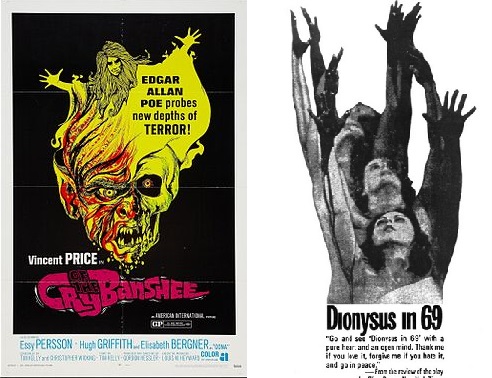

by Fiona Moore
Seven months into the new decade, I would quite like the old one back. New Worlds seems determined to make its promise to carry on for another hundred issues an ironic one; the music scene is in disarray; Miss Ono has announced she and her less talented husband are leaving the country for the United States. And there are no new movies worth reviewing. Necessity forces me to pay my money to the increasingly dilapidated local cinema in Staines on a weekend to spend ninety minutes of my life watchng "Cry of the Banshee".
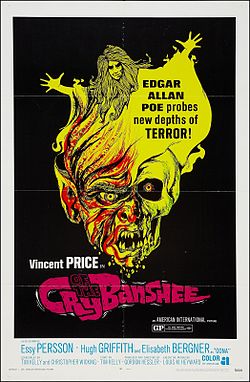
British horror film has been in something of a rut since Witchfinder General two years ago. "Cry of the Banshee" is clearly attempting to cash in on "Witchfinder General"’s success, as it features Vincent Price as a seventeenth-century nobleman and magistrate who’s become obsessed with destroying the local witch, Oona (Elisabeth Bergner). There are lots of "Witchfinder General" references, including casting Hilary Dwyer as Price’s morally dubious daughter, a scene where a pretty young lady is burned to death on a cartwheel for no good reason, and a climactic fight up a staircase in a tower.
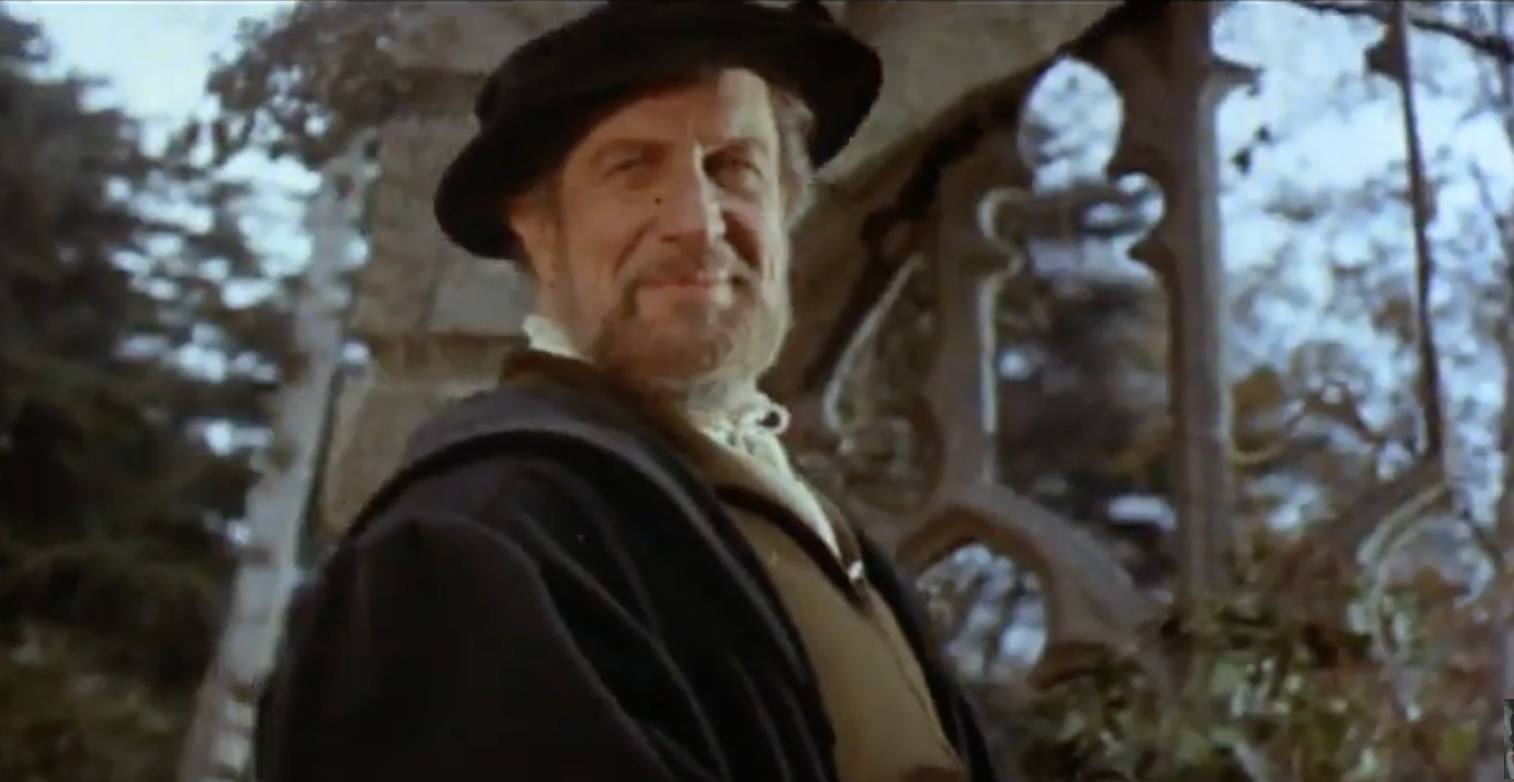 Vincent Price looking pleased with himself for some reason.
Vincent Price looking pleased with himself for some reason.
However, where the twist in "Witchfinder General" was that witches don’t exist and the horror stems from people doing awful things from the belief that they do, this movie tries to have its cake and eat it. Witchcraft is real and Oona, or somebody, is out to get Vincent Price and his family, which might seem to justify his going after her, if it weren’t that he and his family are also singularly awful people. And of course he also has to be going after innocent people too, just to keep that "Witchfinder General" vibe going. The movie also can’t make up its mind if Oona is evil or just a hippie: she and her followers are initially portrayed as more innocents being unjustly persecuted for their lifestyle, but then she starts instigating murder, which made it rather difficult to sympathise with her.
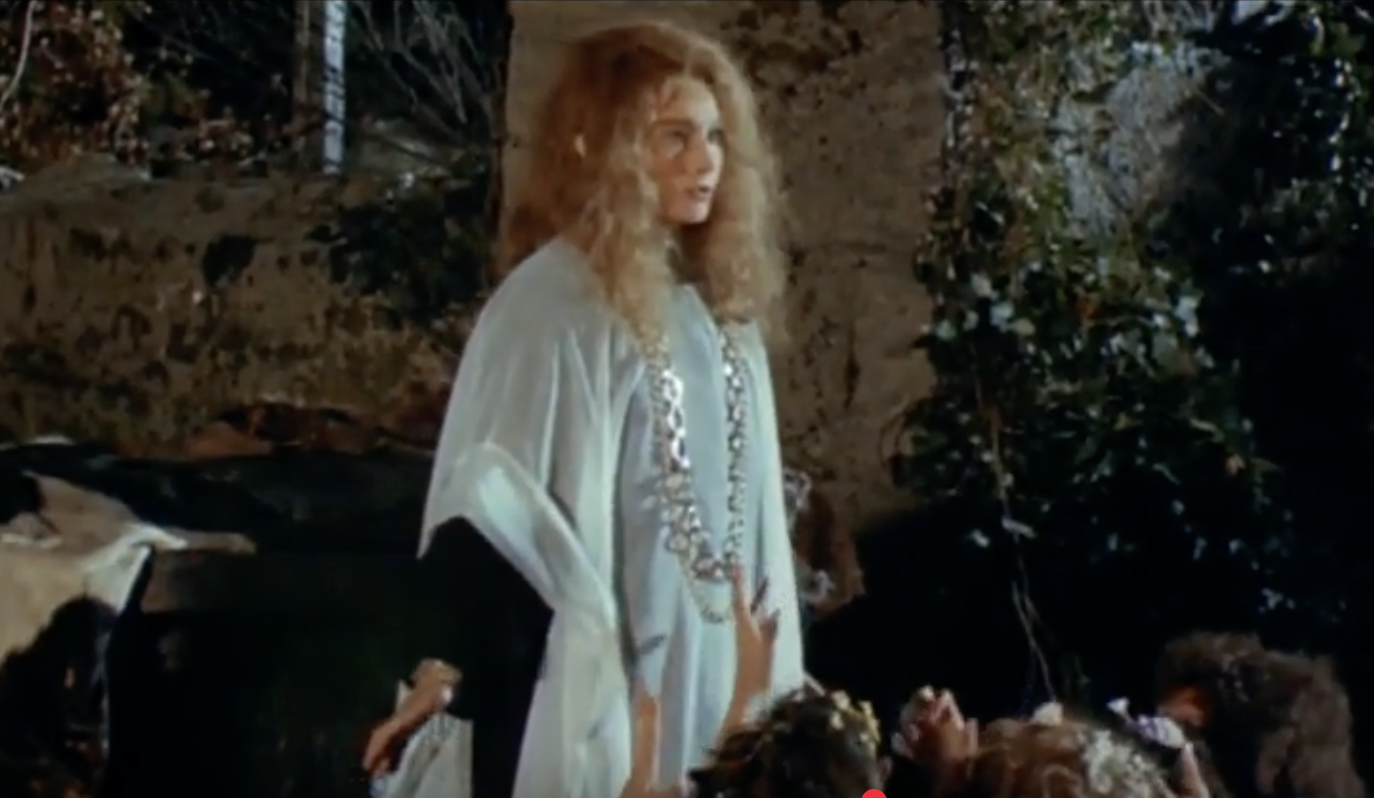 I'm going with both evil AND hippie
I'm going with both evil AND hippie
The whole thing just feels like someone is copying the main beats of "Witchfinder General" without understanding the point. There’s some scenes where an, of course, innocent woman is brutally tortured which just seem to be there for gratuitous sadism and the excuse to show breasts onscreen, rather than to explore the ways in which people are incrementally drawn into evil. There’s some equally gratuitous rape, which again seems to be there for titillation rather than character motivation. There's no sense at all of what's motivating the villagers to accuse their (always young, pretty and female) neighbours of witchcraft. There’s little sense that Oona’s cult of toga-wearing teenagers have any connection to the village, which seems unlikely. There’s Patrick Mower as a groom who is probably also a pagan spirit, and is probably the best thing in the movie. There’s some very familiar exteriors. There’s a title sequence by Terry Gilliam which is far better than the rest of the film. I wouldn’t even recommend this for a rainy Saturday afternoon when nothing else is on. One star.
The lack of quality is spotlit by the fact that "These Are The Damned" was shown earlier this month on London Weekend Television. Now that's a clear example of the sort of movie British filmmakers can make. Even though the biker subplot and the theme tune are feeling a little dated, the horror element is still timely and terrifying in a world where the threat of the Bomb, and its aftermath, still hangs over us, and the relationships are mature and realistically portrayed. Here's hoping that "Cry of the Banshee" is just a temporary lapse and we'll be back to making the sort of quality movies we made in the 1960s again soon.
Dionysus in ‘69
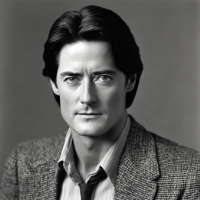
by George Pritchard
The movie theater in my village is set to be closed until January, but our lovely Galactic Journey team has set me up with a very handsome movie projector, and a new movie to go along with it!
As a filmed play, Dionysus in ‘69 is very much a group effort. The play is directed by Richard Schechner, with portions of the text being taken from The Bacchae by Euripides, as translated by William Arrowsmith in 1959. The play was performed with the Performance Group in New York City, although the star actor, William Finley, has previously worked with one of the three directors of the film itself, Brian De Palma (the other two film directors are Robert Fiore and Bruce Rubin).
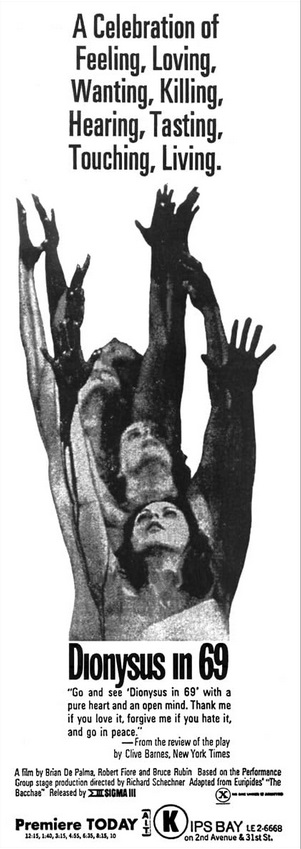
The Bacchae is classified as a tragedy, but it could also be read as a horror story, a tale of sex and godhood, and, most of all, horrific violence. In the play, Dionysus is worshiped by outsiders, by women, in highly sexual ways that do not fit in with mainstream society. For this reason, the X rating on this film well suits Dionysus in ‘69, though it may prove something of a surprise for the theatergoers!
The actors run, tumble, babble, stretch, chant and crawl, crying out and twisting in bodily worship. The audience is involved with the performance, invited to “dance, if you dig the beat”. The stage is not a stage, merely a carpeted space in the middle of the floor, with the audience sitting as they will. De Palma makes the most of his limited funds and space, emphasizing the intimacy of the space while also making the little clearing seem bigger than it really is.
The actors dress minimally, in ways that manage to be modem, spare, and yet ancient at once. The girls are in square, sleeveless shirts that suggest the himations of Ancient Greece, with the male worshipers clad only in black jockstraps. Apparently, when it was done in the theater production, they were wholly naked! Even later in the play, there is little to no costuming, it is all acted within the imagination.
“Now, for those of you who agree with what I just told you, that I am the god, you’re gonna have a wonderful time tonight. As for the rest of you, you’re gonna be in for an hour and a half of being up against the wall.”
William Finley plays Dionysus, born between the stretched limbs of his maenads, every eye on him, because he, Finley, is so beautiful. He is the god, embodies the god, sinuous body and dancer’s limbs, to finger-cymbals and rattle, to flute and tambor and gong, and soft singing…oh, if I could dance with them! Would they like it? Would they let me? Everyone on screen is so slim and muscled and beautiful, and the effects of their song hum through my ribcage in a resounding answer.
The nakedness seems right, here, the involvement of the audience, the way bodies merge and mold together, and most involved of all is Pentheus (played excellently by William “Bill” Shepherd), so pleased to enjoy and so disgusted and uncertain, angry and afraid. The film earns its X rating, and yet does not. Slowly, the ecstasy of the simulated orgy ends, and the worshipers gather in a circle, to watch the drama between Dionysus and Pentheus.
Playing the hippie angle, Dionysus is a long-haired blonde magician in a turtleneck, drawing righteous women away from their proper place with sex and music. The King, Pentheus, does not believe Dionysus is a real god, or that his runaway worshipers are really in the throes of a religious experience. The god is celebrating his birthday party, and invites the audience to join in. The hymns to Dionysus are simple yet strong, and they are overwhelming. “Bill, you’re beautiful, but you’re crazy.” Dionysus says, addressing Bill Shepherd and King Pentheus alike. A wrestling match becomes erotically charged, and I confess that at this point, it was difficult for me to maintain editorial cohesion.
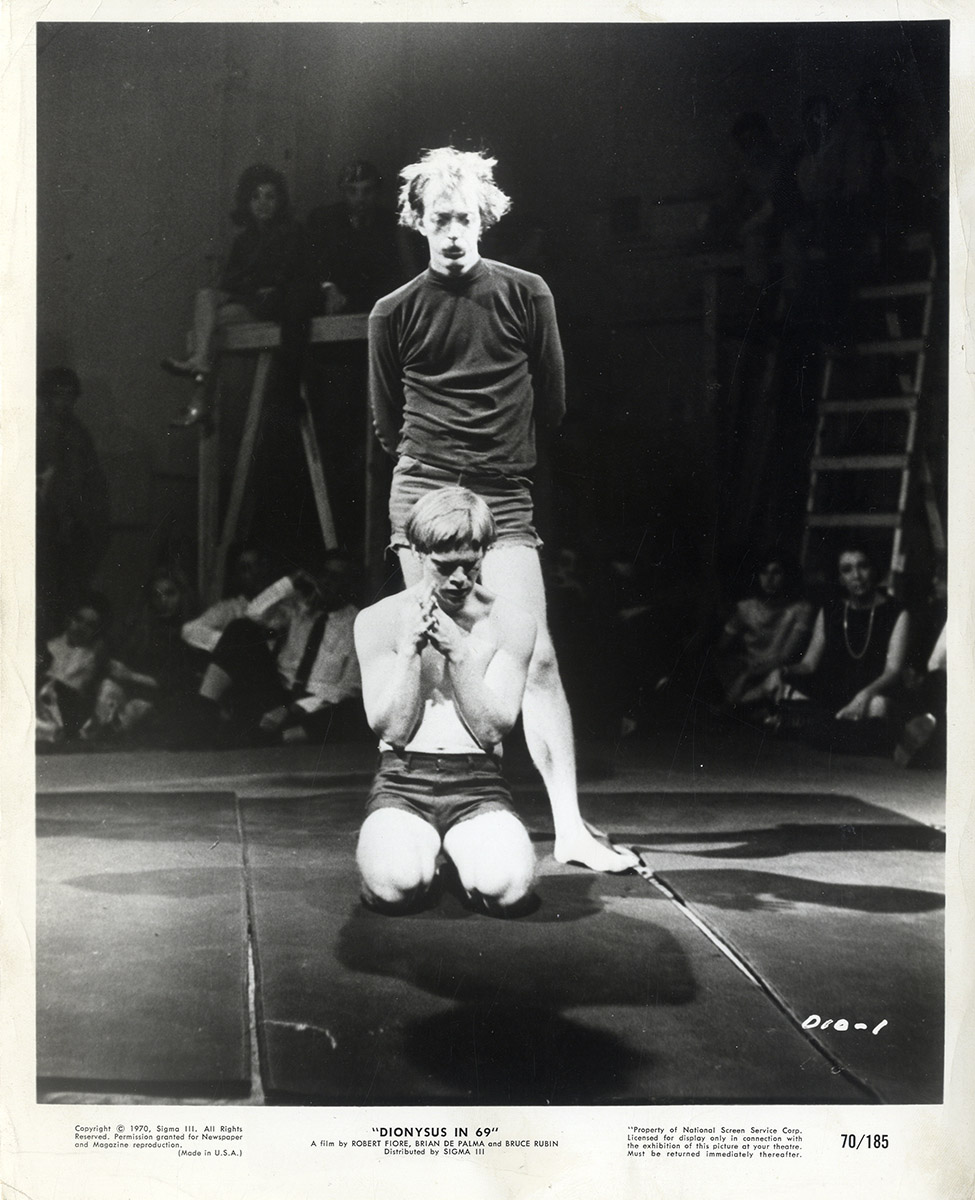 Hot, hot, HOT!
Hot, hot, HOT!
As the two disappear briefly below the stage for a more private ritual, the Bacchae gather, humming as a body. They crouch like hunting things, beasts or men, using the full span of their limbs. Pentheus has already experienced the power and the body of the god Dionysus, but he wants more, much more. No, he wants to spy on the naked rites of the Bacchae, forbidden to outsiders and to men. As Pentheus disguises himself as a Bacchanate, Dionysus removes layers of his own disguise.
“Have you always had horns?” the doomed king asks, much too little and far too late.
“You’re crazy,” the god answers, “But I like you better now.”
A game begins, a game of tag, the last game of the king’s life. He is, indeed, the only man at the ritual, a sight for all men to see, a reward for daring to gaze upon the forbidden and break the rules of the game. Dionysus goes amongst his worshipers, urging them to the hunt, chasing Pentheus through the crowd! Joy turns to horror, to madness, to disgust! The birth ritual is reversed, as Pentheus’ mother tears him apart, as the Bacchae descend en masse, smearing all with blood, thinking him to be a mountain cat.
Early in the play, Pentheus states that “There is no greater wrong than disobedience”, and in the last twenty minutes or so, the hippie angle rises to the surface of the performance like a dolphin through the waves. Dionysus emerges on a raised platform, this time in the oversize Sack suit of a student protestor. Apparently, Schechner views this story as a lesson on how there is no “free lunch”, only temporary liberation, and thus, a speech follows. How this is “…the latest Watts, latest Vietnam, latest Dallas.”, where the “pleasure seekers” became a “mindless mob”. “You didn’t turn me on, you didn’t freak me out, you did nothing for me.” Schechner-as-Finley-as-Dionysus states through a bullhorn, before announcing his mock presidential bid. “A vote for William Finley in ‘68 brings Dionysus in ‘69!”
I think that this play needed to be done. Written through 1968, filmed in 1969, released in 1970, its production speaks to the rapid social transformation the world has been going through in the past few years. While I found the speech at the end to be something of a stretch, one particular quote was a message I could truly get behind.
“No more rituals, we want the real thing.”
Four stars.
[New to the Journey? Read this for a brief introduction!]

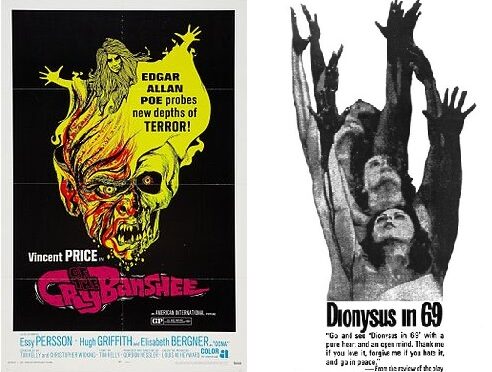


Excellent reviews! Thank you Fiona for suffering so that others need not! A noble sacrifice indeed!